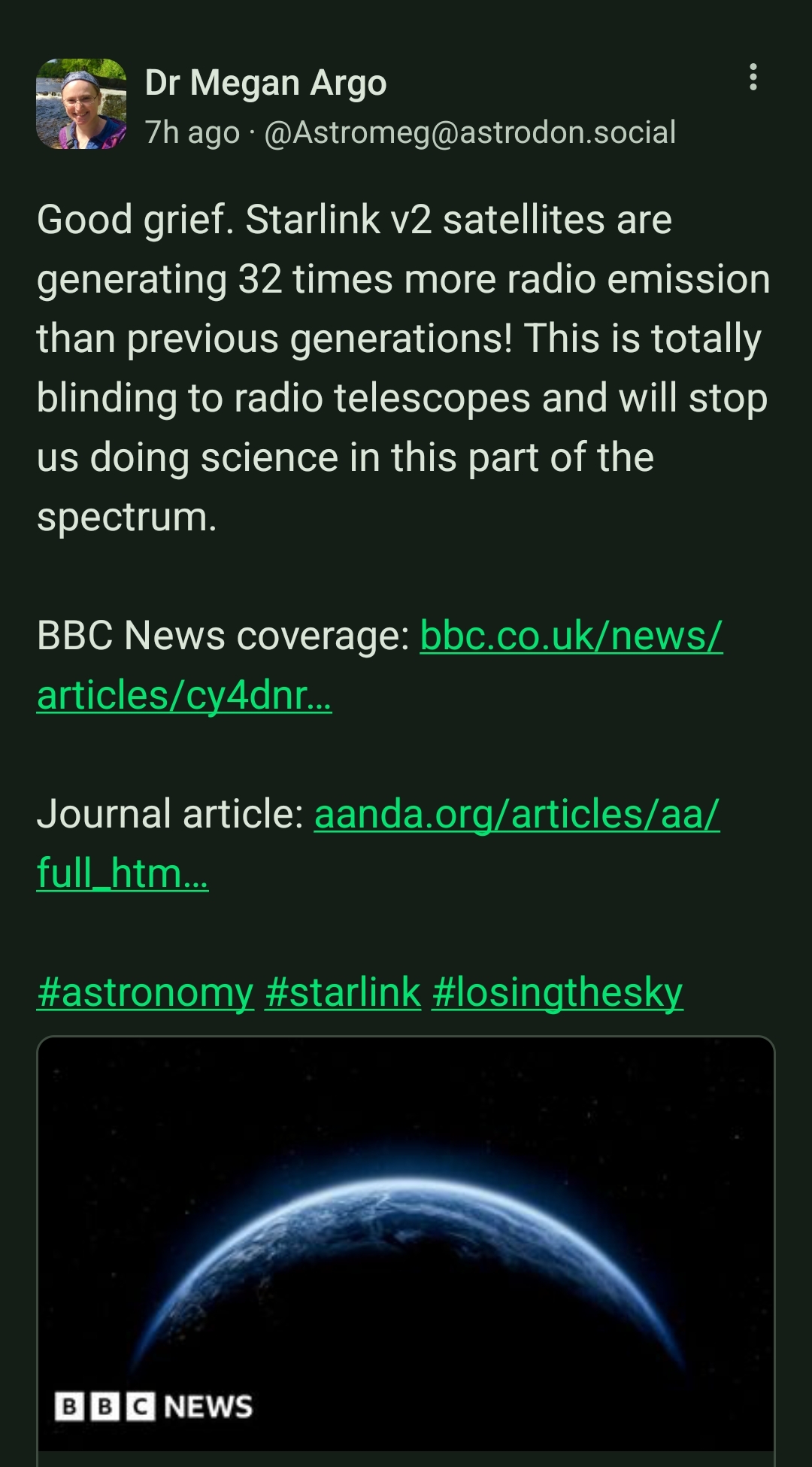this post was submitted on 18 Sep 2024
1215 points (97.4% liked)
Microblog Memes
6036 readers
2319 users here now
A place to share screenshots of Microblog posts, whether from Mastodon, tumblr, ~~Twitter~~ X, KBin, Threads or elsewhere.
Created as an evolution of White People Twitter and other tweet-capture subreddits.
Rules:
- Please put at least one word relevant to the post in the post title.
- Be nice.
- No advertising, brand promotion or guerilla marketing.
- Posters are encouraged to link to the toot or tweet etc in the description of posts.
Related communities:
founded 1 year ago
MODERATORS
you are viewing a single comment's thread
view the rest of the comments
view the rest of the comments

Don't worry, greed ensures that Kessler Syndrome will get them in the not too distant future. Sure hope you aren't reliant on GPS or other satellite services, but at least, for a shining moment, shareholders got some value. /s
Starlink is a very low orbit. Even if something like that happened, it would clean itself up in like five years
The satellites are constantly giving themselves small boosts to maintain orbit and then are deorbited in 5 years when they run out of fuel. It should be well less than 5 years to resolve a LEO Kessler type situation from starlink.
When 2 satellites collide, the pieces don't all stay on the same altitude. Even though none of them will be in a stable orbit, all it takes is for one piece to smack into a satellite that's a bit higher up before it de-orbits, and boom, now you've got a debris field that won't de-orbit.
Pieces don’t gain kinetic energy in a collision. Even if they collide and get sent off in an “upwards” direction, it’s not up very far relative to the orbit, and that’s just a less circular orbit at lower speed that will burn up even faster
For you scenario to work, there would have to be a chain reaction
Each chance is remote enough, and ricocheting pieces only go so far, and any higher satellites they could reach are also low orbit, that I can’t imagine how remote the chances of this happening are
Kessler syndrome is a real worry, but not in this low orbit
Not wrong, and yet small parts of that 'orbit' would kinetically increase, in a Kessler sort of way...
Sorry, you're probably right. It's a thing I expect to be problematic if the future. Of course all problems will burn up in the atmosphere...
and isn't that a nice thought, but no, it raises orbit fairly naturaly...
GPS/GLONASS/Galileo are at ~20,000km vs starlinks ~500km, all the LEO satellites would be fucked but global positioning would be fine. Sounds good to me.
Wouldn't interference from all the junk in between be at least somewhat of a problem, particularly given that the average GPS receiver already isn't super sensitive nor accurate?
Unlikely. There would be very little, if any, interference with signals unless they were extremely precise. The issue is physical stuff getting destroyed by debris.
Think of a very light sprinkling of rain, but imagine if every raindrop was solid and moving faster than a bullet. Walking out in it would be deadly, but likely wouldn't affect your cell phone service. Well, besides the tower itself and every structure in the area getting absolutely shredded.
Yeah, I suppose I'm over-estimating the density/amount.
GPS works under tree cover, I doubt some spread out space junk is much of a problem.
Yup, but scatter might be bad...Still, in principle, better satellites live...